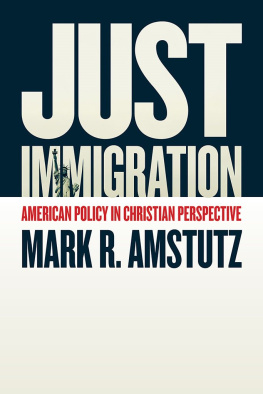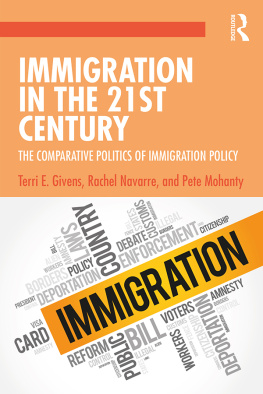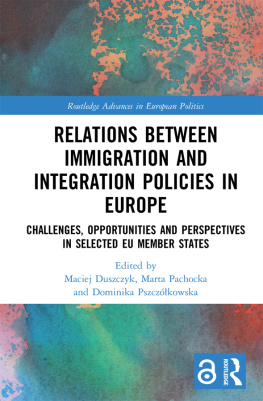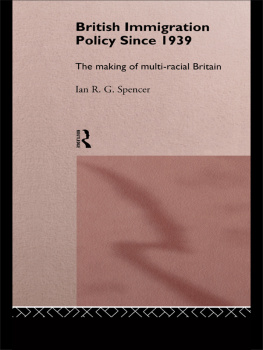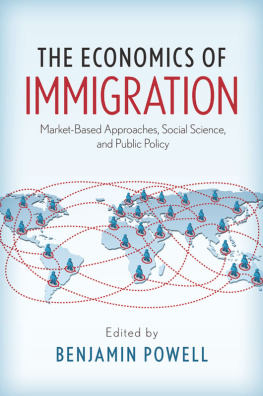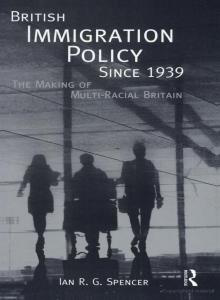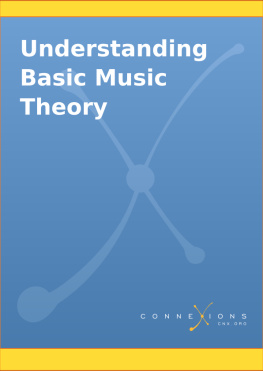The International Behavioural and Social Sciences Library
IMMIGRATION AND SOCIAL POLICY IN BRITAIN
The International Behavioural and Social Sciences Library
SOCIOLOGY & SOCIAL POLICY
In 10 Volumes
Immigration and Social Policy in Britain
Catherine Jones
First published in 1977 by
Tavistock Publications Limited
Reprinted in 2001 by
Routledge
2 Park Squar0, Milton Park, Abingdon, Oxon, OX14 4RN
Transferred to Digital Printing 2007
Routledge is an imprint of the Taylor & Francis Group
1977 Catherine Jones
All rights reserved. No part of this book may be reprinted or reproduced or utilized in any form or by any electronic, mechanical, or other means, now known or hereafter invented, including photocopying and recording, or in any information storage or retrieval system, without permission in writing from the publishers.
The publishers have made every effort to contact authors/copyright holders of the works reprinted in the International Behavioural and Social Sciences Library. This has not been possible in every case, however, and we would welcome correspondence from those individuals/companies we have been unable to trace.
These reprints are taken from original copies of each book. In many cases the condition of these originals is not perfect. The publisher has gone to great lengths to ensure the quality of these reprints, but wishes to point out that certain characteristics of the original copies will, of necessity, be apparent in reprints thereof.
British Library Cataloguing in Publication Data
A CIP catalogue record for this book
is available from the British Library
Immigration and Social Policy in Britain
ISBN 0-415-26500-2
Sociology & Social Policy: 10 Volumes
ISBN 0-415-26517-7
The International Behavioural and Social Sciences Library
112 Volumes
ISBN 0-415-25670-4
Printed and bound by CPI Antony Rowe, Eastbourne
Immigration and Social Policy in Britain
CATHERINE JONES
First published in 1977
by Tavistock Publications Limited
2 Park Square, Milton Park,
Abingdon, Oxon, OX14 4RN
Photoset by Red Lion Setters,
Holborn, London
ISBN 0 422 74670 3
Catherine Jones 1977
To my mother and father
Contents
This book has been quite a long time in the making. I do not think it would have materialized at all without the help, encouragement, and guidance I have received from friends, colleagues, and organizations at various stages.
My thanks are due in the first place to the Social Science Research Council, for agreeing to sponsor an enquiry into 'The Response of the Statutory Social Services to New Commonwealth Immigration'. The information the survey provided (which formed the basis for chapters seven and eight) was indispensable for the design of this book and, without the SSRC's help, it could not have been completed.
In turn, the successful completion of the Survey was due, first of all, to the cooperation, patience, and forbearance of a wide range of social service representatives who were prepared, not merely to respond in a nominal sense by detailing someone to complete the questionnaire, but actively to put themselves out and, in many cases, volunteer to be interviewed notwithstanding their own crowded timetables. The Survey operation as such, however, owed much to the thoroughness with which my research associate, Rosamund Chorley, sifted through and organized the initial questionnaire returns, timetabled the eventual interview schedule (in itself a major feat), and herself conducted many of the interviews.
Brian and Barbara Rodgers of Goostrey, Cheshire (former members of the Social Administration Department at Manchester University), Professor Garth Plowman of the London School of Economics, Dr Steven Lukes of Balliol College, Oxford, and Professor S.E. Finer of All Souls College, Oxford, each had the patience and generosity to read (and in some cases re-read) the manuscript at various stages of its preparation and to offer valuable criticisms and suggestions.
The Nuffield Foundation kindly awarded me a grant towards the cost of having the final manuscript typed in preparation for publication. For the typing of the manuscript itself, however, I am indebted to Mrs Judith Scammels of Worsley, Manchester, whose speed, accuracy, and above all good sense can scarcely be overstated.
I have been very fortunate, therefore, in all the help I have received. The interpretations presented and the conclusions arrived at in this study are, nevertheless, mine and my responsibility. One can only help a writer so far, after all. After that he is on his own.
Catherine Jones
November 1976
Part I
The argument
1
Introduction: immigration and social policy
Mass immigration to this country furnishes not merely a commentary upon, but in many ways a test of, prevailing statutory social policy. Such at least is the proposition underlying this study. It is one that I hope to demonstrate and develop by comparing three instances of mass immigration, each coinciding with a different phase of British social policy development. Thus we shall be examining the years of Irish immigration, c. 1800-61; the years of East European Jewish immigration, c. 1870-1911; and the years of New Commonwealth immigration, c. 1950-71. [1] Before proceeding to the case-studies themselves, however, I shall first explain my approach in greater detail and then, in the following chapter, set the scene for the rest of the book by discussing British social policy development over the whole period in question.
The idea, of looking at the relationship between immigration and statutory social policy in the context of social policy development, was one that arose out of an initial duality of research (and teaching) interests: New Commonwealth immigration and its impact upon present-day social policy, on the one hand, and nineteenth/early twentieth century social policy in Britain, on the other. What had seemed at the start to be two quite separate fields of interest, however, came gradually to appear more closely connected. In particular, the study of present-day immigration and its social policy implications seemed to demand some historical perspective.
New Commonwealth immigration, to judge from the evidence available, was of three-fold significance for contemporary statutory social policy. To begin with, the mere presence of such newcomers in this country helped to show up some of the shortcomings as well as some of the strengths of Welfare State social services provision. Yet such a presence seemed, in the second place, to furnish not merely a passive commentary upon but an active test of the problem-solving capabilities of social service agencies faced by sometimes novel, sometimes controversial, and often greatly increased demands upon their facilities. Set against this, however, there was a third tendency apparent: for the social services themselves to feature as bones of contention in the host-immigrant context and for them thus to constitute a problem-exacerbating as well as a problem-solving resource.








